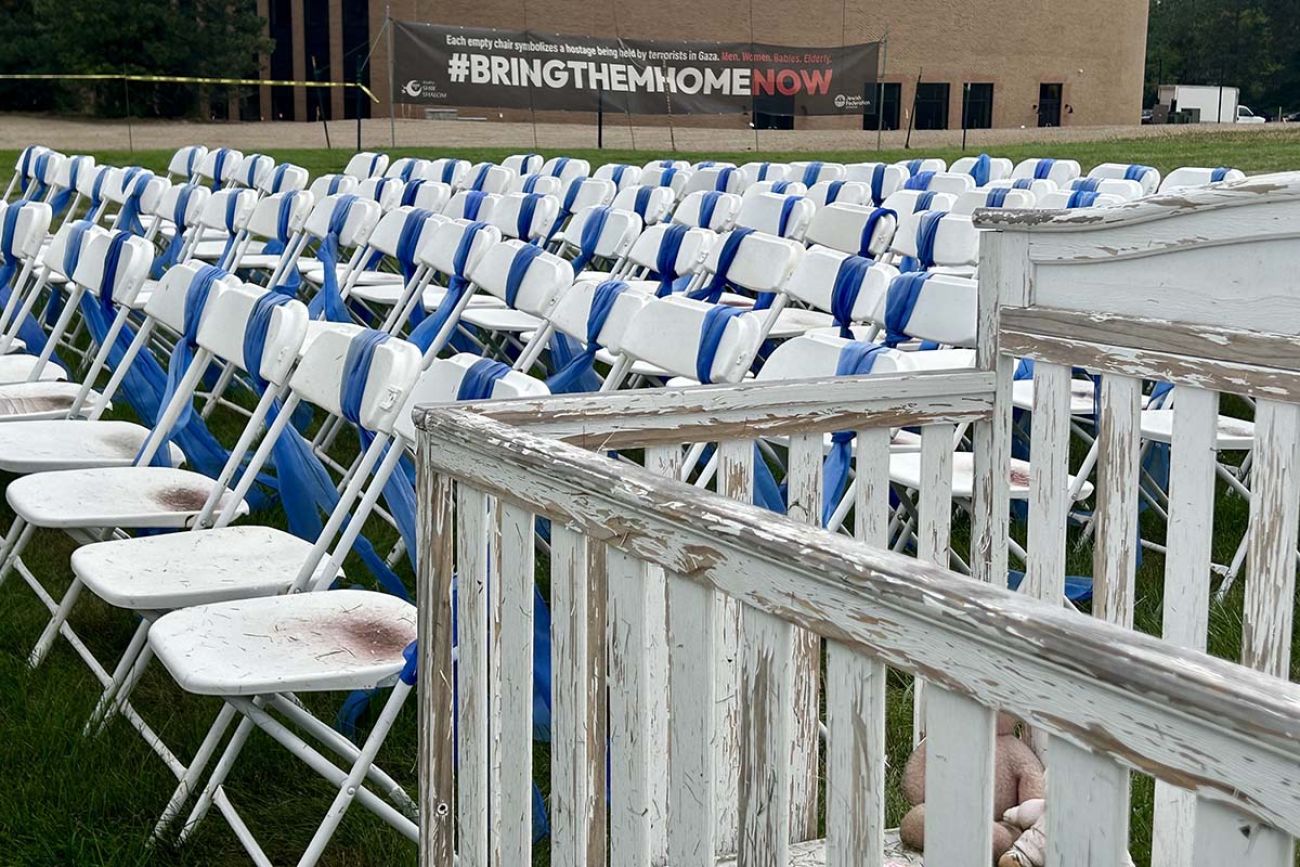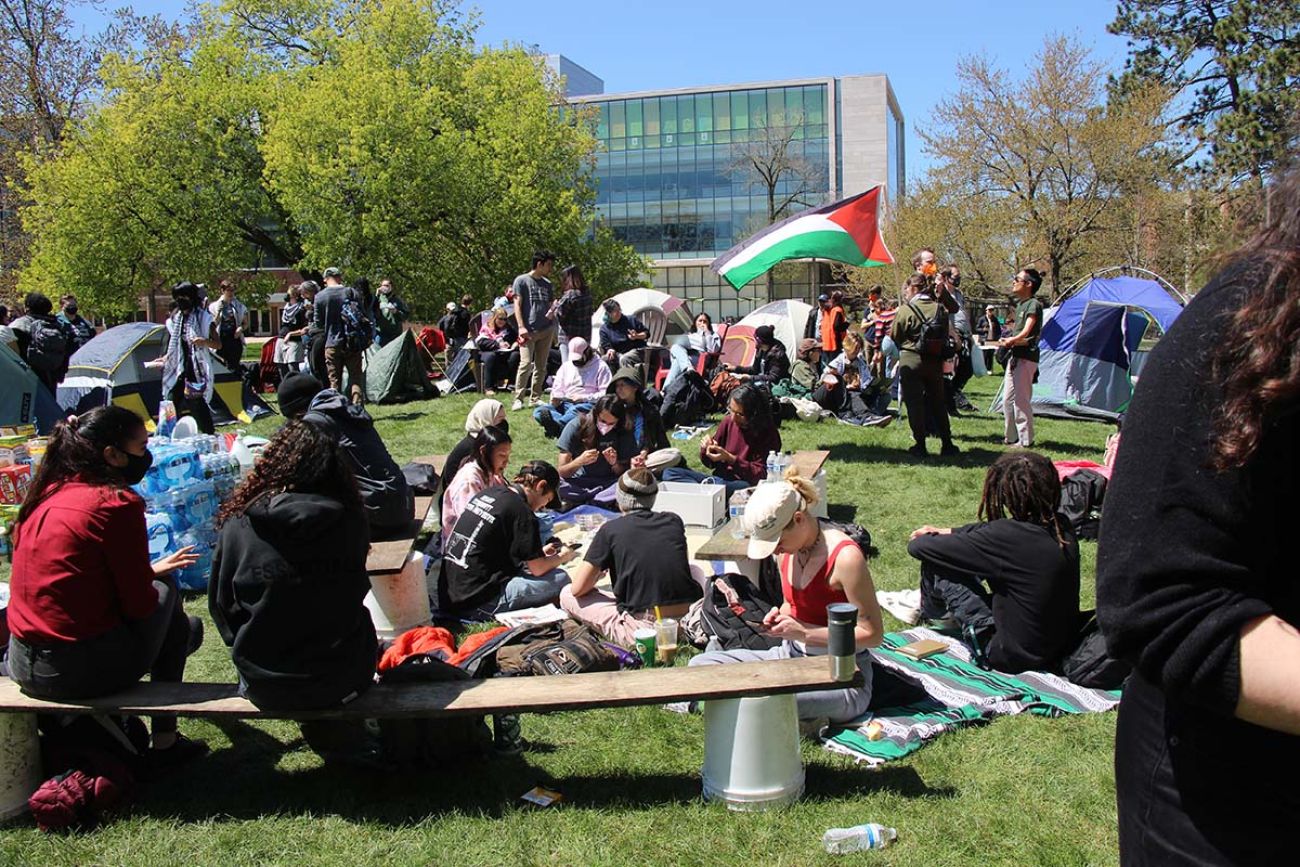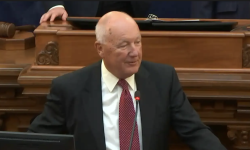As Gaza war rages on, some fear Democrats can ‘kiss Michigan goodbye’

- As the ongoing fight between Israel and Hamas continues, questions on how the war will impact 2024 presidential election results linger
- Michigan is home to both sizable Jewish, Muslim and Arab American populations, making the topic more personal than with other states
- While some experts are bullish on it not impacting Michigan’s turn out, others aren’t too sure
LANSING — One year after Hamas-led attacks in southern Israel ignited a Middle East war, the ongoing conflict has frayed relationships in the United States and fueled harassment ahead of the critical presidential election.
It's been "an absolutely hellish year," said Jeremy Moss, a Southfield Democrat and the only Jewish member of the Michigan Senate.
Moss represents metro Detroit communities with sizable Jewish populations, including Bloomfield Hills and his hometown of Southfield.
It’s those voters, Moss said, that are “struggling to be seen right now” in the Democratic Party, “especially with the growing rise of antisemitism on the left.”
There were an estimated 8,873 incidents of antisemitic harassment, vandalism or assault in the United States during 2023 according to recent data from the Anti-Defamation League, a New York-based group established to combat bigotry, discrimination and antisemitism in the U.S.
Related:
- Kamala Harris met with Dearborn mayor amid anti-war push by 'uncommitted'
- As University of Michigan classes resume, so do pro-Palestinian demonstrations
- Michigan 2024 results: 13% of Democrats ‘uncommitted.’ Will it matter to Biden?
That’s a 140% increase in incidents from 2022 and is a higher total than 2020, 2021 and 2022 combined.
But it’s a sense of abandonment that also rings true among some Arab American and Muslim voters who believe the Democratic Party has turned its back on their communities as it continues to arm Israel in its fight against Hamas.
Last year also saw record high numbers of discrimination and attacks against Muslims and Palestinians nationwide. Data from the Council on American-Islamic Relations, which recorded 8,061 incidents — almost half of which occurred between October and December of that same year.
Tensions among Michigan’s Jewish and Arab American communities, with respect to how Democrats have reacted to the Oct. 7 attacks, have remained steady in the year since the militant group Hamas killed nearly 1,200 individuals and kidnapped another 251, the bulk of whom are civilians.
Israel retaliated, and more than 41,000 Palestinians have been killed during the ongoing war in the Gaza Strip, where the death toll continues to climb as civilians lack needed humanitarian aid.
The war has divided Americans politically, particularly Democrats, who are struggling to maintain support from both Jewish and Arab American voters in Michigan, a critical swing state where former President Donald Trump and Vice President Kamala Harris are locked in a statistical dead heat.
“If something is not done, rather decisively, Democrats could kiss Michigan goodbye,” said Jim Zogby, founder and president of the Arab American Institute, a Washington.-based political and policy research non-profit.

Moss said similarly, telling Bridge Michigan earlier this week that while Jewish Democrats “know Donald Trump is an unacceptable choice,” some community members have told him they “need to hear more from Kamala Harris, because they fear the shift that could come in the Democratic Party.”
The Michigan focus
Michigan is home to roughly 105,000 Jewish adults, comprising 1.4% of the state's electorate according to the American Jewish Population Project.
It’s also home to the country’s largest concentration of Arab Americans in Dearborn. Census estimates put the number of Michigan's total Middle Eastern population at more than 310,000 residents as of 2022.
It’s no surprise, then, the ongoing conflict in Gaza — which has now spread to involve Lebanon, Syria and Yemen — has remained a topic of concern for many Michigan voters, especially those within the Jewish and Arab American communities.
In February, that concern culminated in the move to vote “uncommitted” on Democratic presidential primary ballots. At the time, President Joe Biden was at the top of the ticket, and voters hoped a protest vote would signal their displeasure over the administration’s continued support of Israel amid the ongoing conflict in the West Bank.
Experts say that movement, which culminated in roughly 100,000 “uncommitted” votes in the presidential primary, was not large enough to spell doom for Democrats, who have been criticized in ongoing protests given the party’s control of the White House.
But in a state that Trump won by fewer than 11,000 votes in 2016, Democrats are still hoping to win back some of those voters. Harris, who held a rally in Michigan on Friday, also met with Muslim and Arab American leaders, according to an official with her campaign.
“This isn’t really moving the needle with most people who are paying attention to the election,” said Adrian Hemond, a Democratic strategist with the bipartisan Grassroots Midwest consulting firm in Lansing. “Americans mostly don’t care about foreign policy.”
He also cautioned looking at the “uncommitted” protest vote as wholly comprising traditionally Democratic-leaning voters, saying that many Muslim and Arab American voters were “slight majority Republican voters until 9/11, and a great many of them are still very socially conservative.”
Arguably Michigan’s most successful turn out for an “uncommitted” vote effort was in 2008, when then-candidate Barack Obama did not appear on Michigan’s primary ballots. At that time, nearly 238,168 individuals, or just over 40%, voted uncommitted to signal their preference.
Since then, however, uncommitted votes have been rare. They accounted for less than 2% of the vote in both the 2016 and 2020 Michigan Democratic presidential primaries.
But to John Zogby, brother of Jim Zogby and Democratic pollster by trade, Michigan Democrats do have a reason to be concerned about November.
His recent polling data, released Oct. 2, suggested Arab American voters nationwide are almost evenly split between Harris and Trump, who had a 1% lead with the demographic.
That’s even after Democrats regained ground in the realm of public opinion after Biden bowed out of the race in July.
“The biggest enemy here, right now, is distrust that voters have, and those who say that they’re probably not going to vote,” John Zogby said.

Where the candidates stand
Harris marked the anniversary of the Oct. 7 attacks on Monday, saying she wants to “ensure that the threat Hamas poses is eliminated” and that her “commitment to the security of Israel is unwavering.”
In her statement, Harris said it was also incumbent “the people of Gaza are free from the grip of Hamas” and said she thinks the only way to achieve a peaceful resolution is to find “a diplomatic solution across the Israel-Lebanon border region.”
That’s consistent with Harris’ public position since March: She supports calls for a ceasefire and the concept of a two-state solution, which would see a sovereign Palestine and Israel as independent nations.
She has also repeatedly stressed Israel “has a right to defend itself” and that a ceasefire can only come with a guaranteed return of Hamas-held hostages, some of whom are Americans.
Anti-war critics, however, contend Harris is not doing enough to stop the conflict. She has rejected calls for an arms embargo on Israel, for instance.
Leaders of the “uncommitted” movement in September declined to endorse either major party presidential candidate, saying that while they believe a Trump presidency would “accelerate the killing in Gaza,” Harris’ “unwillingness to shift on unconditional weapons policy” makes it “impossible” to support her.
In an August campaign rally in Romulus, anti-war protesters disrupted Harris during her first event with running mate Tim Walz. Harris went somewhat viral for her response to those chants, telling the audience that if they “want Donald Trump to win” they could keep yelling, “otherwise, I’m speaking.”
Since then, the country’s top Muslim-voter organization, Emgage Action, has endorsed Harris, writing in a statement that while the group did not agree with Harris “on all issues,” the support was meant to be an “honest guidance to our voters regarding the difficult choice they confront at the ballot box.”
Trump, meanwhile, has maintained consistent support for Israel, at one point pitching a peace plan which would have allowed Israeli settlements in the West Bank to remain and for the country to maintain control of Jerusalem, much to the ire of Palestinian political leaders.
But Trump also raised brows among Israeli leaders earlier this year when he said the country needed to get the conflict in Gaza “over with” as Israel was “absolutely losing the PR war.” He’s additionally been critical of the Oct. 7 attack itself, saying in a Time interview Israeli leaders had “everything … there to stop that” in terms of military intelligence and still failed to act.
Trump’s campaign said Monday that he stands “in solidarity with Israel” and blamed Harris for the continued conflict, criticizing what it called “her lack of competence in international diplomacy” as part of the Biden administration.
Trump additionally plans to participate in a remembrance ceremony with Jewish community leaders at a hotel he owns in Miami.
The former president has not faced much political backlash for support of Israel, however, as pro-Palestinian activists have largely focused their ire on Democrats who control the White House.
That was the sentiment of a recent endorsement from Hamtramck Mayor Amer Ghalib, who represents the only Muslim-majority city in the United States.
“For those who consider us as just numbers on the side, or on the margins of history, this is not the case anymore,” Ghalib said in a video, further explaining his endorsement.
“I will take and face the consequences of my decision.”
What comes next
While polling indicates that a majority of Americans now oppose Israel’s military action in Gaza, the war has not ranked very high among top issues for the median voter — even since before Biden dropped out of the race.
In Michigan, war in the Middle East was not among the top five most important issues to voters heading into November, according to data released last month from the Marist Institute for Public Opinion.
Preserving democracy, tackling inflation, addressing immigration, keeping abortion legal and bettering the country’s health care system all ranked higher, according to their survey of nearly 1,400 voting-aged adults. The ongoing war placed slightly ahead of concerns about crime.
“People have to be adults about the world of the possible,” said Hemond, the Democratic strategist. “One of these two people is going to be elected president in November. … They may not like voting for what they view as the lesser of two evils, but that’s how politics works.”
That’s the case with Stephen Calkins, a professor at Wayne State University.
He told Bridge that while interested in how much of an impact the war could have on Michigan’s presidential election results, “I’m a moderate who will vote against Trump, and would have whether he was running against Biden or Harris.”
While there are people who do plan to withhold their vote — or not vote at all — Carlene Przykucki, 72, of Alpena, said having a second Trump presidency would do little to achieve a two-state solution between Israel and Palestine, which is what she believes “is the only answer.”
“I don’t really get lathered up about that, in terms of my election views,” Przykucki said of the war. “I think that the leaders of our country are in a position to have tons more information than we as the public do.”
Moss, the Southfield Democrat and state Senator, said he’s “fully in recognition of the pain that is going through the Arab American community,” though he still considers Harris “the only acceptable option” to end the fighting in Gaza and elsewhere.
“I don’t feel great about where the state of things are at the moment … but we won’t even have the opportunity to work out those challenges together if Donald Trump is president,” Moss said.
See what new members are saying about why they donated to Bridge Michigan:
- “In order for this information to be accurate and unbiased it must be underwritten by its readers, not by special interests.” - Larry S.
- “Not many other media sources report on the topics Bridge does.” - Susan B.
- “Your journalism is outstanding and rare these days.” - Mark S.
If you want to ensure the future of nonpartisan, nonprofit Michigan journalism, please become a member today. You, too, will be asked why you donated and maybe we'll feature your quote next time!





